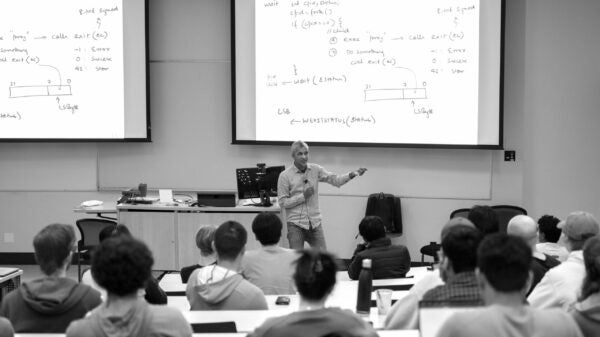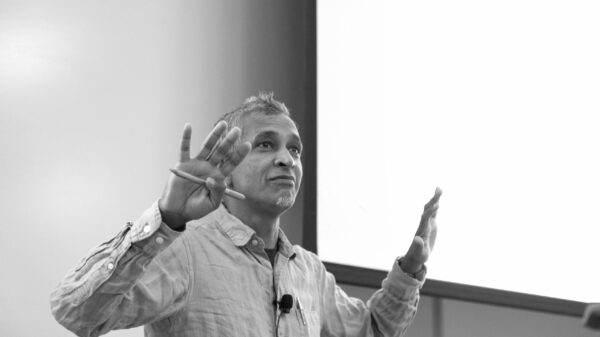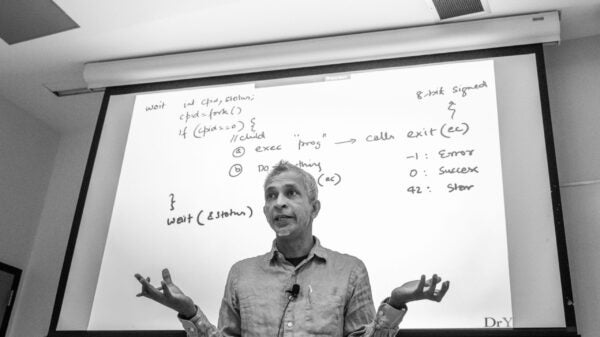Many faculty awards come as happy surprises, seemingly out of the blue. Such is not the case for the prestigious Regents’ Outstanding Teaching Award, for which one must apply. A campuswide awards committee reviews the entries and makes its recommendation, which, in the case of the Regents award, bestowed by The University of Texas System, normally becomes the winner.
After being voted best teacher of computer engineering multiple times by students at The University of Texas at Austin, Ramesh Yerraballi decided to apply for the $25,000 award. He did not win. “I was really annoyed!” he says. The next year, he was asked to serve on UT Austin’s awards committee, and he saw from the inside the level of competition. “How vain of me to think that I deserved to win!” he says laughing. “Some of these nominations were so impressive that I cried reviewing them.” At the same time, he realized that the winning faculty members really told a story with their applications. “You don’t just do a data dump on them and say, ‘This is who I am.’ You have to present yourself. So the first thing I realized was, ‘You’re not that good,’ and second, ‘You didn’t really bother to present yourself.’”
Understanding the landscape and the process better, he applied again, and again he was passed over, though now without the indignation. After his third try in 2022, Yerraballi was named the latest winner of the award. He celebrated the next day by taking cookies to his classes. Writes one former student in an evaluation, “He really cares and knows the key to our hearts is free cookies.”
Other Yerraballi alumni have written, “Dr. Y is one of the best instructors and lecturers I’ve ever had. His teaching makes even the most obscure concepts simpler and easier to understand.” And “Dr. Y was an impeccable prof, who went above and beyond in teaching the low-level aspect of computers in EE 306. His lectures were intriguing, and his teaching style was unequivocally the best of any teacher I have had in my life.”
Others go further still: “Yerraballi is a god.” Another writes simply “Yerraballer!”
So what is it about his teaching that students love so much? For that, we must return to the mid-1980s and south India.
Defaulting to Excellence
Yerraballi’s grandfather and all his uncles were farmers — millet, lentils, onions, tomatoes. His father was the first in his family to leave farming and attend college. He became a supply manager for a company that manufactured “heavy electricals,” industrial equipment critical to the energy sector, outside of Hyderabad, the capital of the state of Telangana. His mother had her hands full at home with a girl and three boys, of whom Ramesh was the youngest. The plant employees and their families lived on-site in what Yerraballi calls an isolated, public-sector “colony,” where education was very good. “My father was educated enough to give us the best, so I had a really good childhood because of that.” Ramesh’s was a mostly outdoor boyhood, playing cricket, soccer, field hockey and games particular to the region. Not having a TV until age 12, he spent indoors time either reading or listening to the radio.

Yerraballi was an average student, doing just enough not to draw attention. “I didn’t have to be better than my peers; I just had to be better than my brothers,” he says laughing.
One day, at about 13, he was walking home from school when a young man new to the community asked Yerraballi what grade he was in. He told him, and then the man asked to see his math book. The man, who Yerraballi later learned had graduated at the very top of one of India’s elite universities, was genuinely excited about math. “I had never met anyone who was excited about doing math.”
The man asked Yerraballi if he could tutor him, free of charge. “I said, ‘Yes, under one condition: You’ll teach me as if I don’t know anything. I’m an average student, and on any given day, my confidence is 50/50 on anything.’”
Almost every day after that chance meeting, Yerraballi stopped at the young engineer’s house to do his math homework, while the man split his attention between Ramesh’s problems and a crossword puzzle. “His excitement was so infectious,” he remembers. While the teachers at Yerraballi’s Catholic school had insisted on a set way of reaching solutions, the young engineer showed him there were many ways of getting to the right answer, if he had a deeper understanding of the problem. “He was brilliant. He taught me the joy of math but also the joy of English, of reading good prose.”
Soon, Yerraballi was average no more. While fellow students were solving problems in the textbook, he was solving problems way beyond their level, problems the engineer was making up. When Yerraballi took his state entrance exam for college, he ranked 155 out of 100,000. He could go anywhere and do anything related to math.
Yerraballi recounts his journey into and up through computer science as a series of defaults rather than choices driven by a passion. In middle-class Telangana at the time, there were only two fields deemed worthy of pursuing: medicine and engineering. His high math scores gave him automatic entree into engineering, and because computer science was considered the most elite field within engineering, he defaulted to it. He then defaulted to nearby Osmania University in Hyderabad because it was the top school in the state.
At this point, Yerraballi had never seen a computer, save the CNC machine (computer numerical control) at his father’s workplace that used punch cards.
The result of what he calls his home state’s “narrow-minded view of the world,” in which everyone must be an engineer or a doctor, is that there are few jobs for them once they’ve gotten their education. So they go to graduate school, either in India or the United States. He decided to come to the United States. With $2,000 from his uncle, he secured a spot at Old Dominion University in Virginia, graduating with a Ph.D. in 1996.
How We Almost Let Him Get Away
He launched his teaching career at Midwestern State University in Wichita Falls, and after two years there and a summer outside academia in consulting, he went to UT Arlington. For the next eight years, Yerraballi fought a battle that will sound familiar to young faculty members, trying but repeatedly failing to get funding for research proposals. He believes it was because he did not do the networking that is part of selling one’s work. Finally worn out by the process, Yerraballi left the tenure track, despite rave reviews for his teaching, and committed himself to full-time teaching, with no guilt or sense of compromise.

Ironically, the very next year, in 2008, the UT System created the Regents’ Outstanding Teaching Awards, striking one blow for teaching in a nationwide higher-ed environment that incentivizes the publishing of research often at the expense of teaching.
Yerraballi’s thoughts turned to Austin. Working in technology, his wife, Sameera, found a job quickly, while Ramesh pleaded his case to UT. The then-department heads liked his teaching resume; he had taught virtually every course in the curriculum, undergraduate and graduate. But he was turned away because of his academic pedigree — not having studied or taught at the most elite universities. He appealed. “I can’t change that,” he told them, “but I want to teach here, and I can do a great job. So if you think that you’re getting the right person, irrespective of how I got here, then you can recommend me.” They did, and by 2010, the students had named him the best teacher in the department, an award he has won seven more times to date.
Passion and Pacing
So how does he teach? There is nothing revolutionary about his methods. He uses Socratic questioning and checks in often for understanding. He makes extensive use of the modern version of the overhead projector, using a digital tablet and software (called Ydraw) that he designed himself. “I write everything I say, and I say everything I write.” That ensures he doesn’t go too fast for the students. “Everything I do is paced for consumption,” he says. The software allows him to toggle between his handwritten notes and live coding examples.
He also strongly encourages office hours visits, providing the one-on-one help that was the turning point in his own education and life. He says that teaching a group of students creates a dilemma: If one teaches to the median student’s knowledge, the bottom half of the class is lost, and the top half is bored to death. Office hours let him home in on the gaps in each student’s understanding.
Even though he has taught some of these courses dozens of times, he never recycles notes or lesson plans, instead preparing afresh for every new class based on where the group’s collective understanding was when the last class ended. This semester, he teaches two different sections of the same course, one in the morning, the other in the afternoon — and even for that, he does not have a single outline. “I want to have a fresh perspective even on the same topic. I want to do it for myself as much as for them, because if I’m just going to regurgitate what I did that morning, I can’t have any sense of passion in my delivery. It has to be new. I can’t fake it!”
“I don’t know if I have a gift or I developed it,” Yerraballi says, “but I like to make things accessible. However complicated the topic may be, I like to think I can articulate it in a way that they can comprehend at whatever level of preparedness they have.”

Let’s Go Help People
One final example shows how teaching is just part of who he is.
After the Yerraballis moved to Austin, they bought a 1940s house, and Ramesh gutted it to the studs. “I always had wanted to build things, but where I come from, we didn’t have a culture of building things.” Single-handedly he even tore out the low ceiling and replaced it with a vaulted one, rafter by rafter. As one of many updates, he installed a tankless water heater. It worked great until the freeze of February 2021. The units have a self-preservation feature: When the temperature approaches freezing, they flush the water to keep the pipes from rupturing. But this flushing relies on power. When power went out for two days, water froze in the lines and split the copper tubing.
Replacing the two water heaters he owned would be prohibitively expensive. He had been welding for a while (even welding together components of the homemade bike that brings him to campus every day and now leans in the corner of his office). Having nothing to lose, he cut open the unit, fired up the welding torch, and used brazing rods to seal the crack. When he connected it to power, it worked.
“I then realized there is a neighbor of mine who is old and had the same problem, and he was in pretty bad shape.” So with another handy neighbor, he said, “Let’s go help people. … We went to our neighbor’s house and fixed his.” Soon word got out, and people began to seek his help. Asked how many tankless water heaters he thinks he saved from landfills, he says he and his neighbor personally accounted for 12.
Then the teacher in him kicked in, and he recorded a YouTube video demonstrating the fix. When a UT Ph.D. student saw the video, she decided to give it a try. After fixing her own, she went on to fix “way more than I did,” he says.
How many tankless water heaters did he help save from landfills? Today, the video has nearly 10,000 views. That’s the power of the teaching spirit.
(Photos by Marsha Miller)



